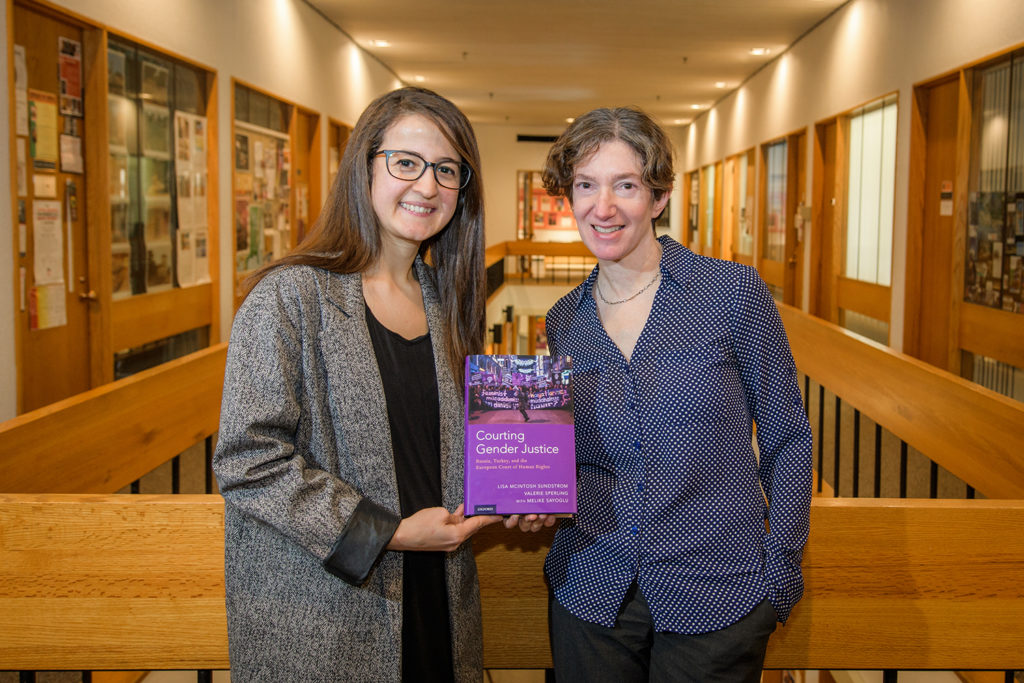Political scientist, doctoral student collaborate on new book, ‘Courting Gender Justice’

Women and members of the LGBTQ community in Russia and Turkey face pervasive discrimination, and only a small percentage challenge their mistreatment in court in their homeland. What stops women from bringing their sex discrimination cases to court — at home and abroad — and when they do, what helps them win?
“Courting Gender Justice: Russia, Turkey, and the European Court of Human Rights” (Oxford University Press), a new book by Valerie Sperling, professor of political science; Clark doctoral candidate Melike Sayoglu; and Lisa McIntosh Sundstrom, associate professor of political science at the University of British Columbia, examines the obstacles to bringing gender discrimination cases to, and through, domestic and international courts, and sheds light on the factors that make rare legal victories possible.
After exhausting their appeals at home, Russian and Turkish citizens can bring their gender discrimination cases to the European Court of Human Rights (ECtHR) in Strasbourg, France. But of the tens of thousands of Russian cases submitted to the court in the past two decades, only three resulted in judgments involving sex discrimination claims — and all three cases were brought by men complaining that their rights had been violated. (The cases concerned parental leave for men in the military, different judicial sentencing guidelines for men and women, and parental child custody rights.)
The authors interviewed human rights and feminist activists, lawyers, and others to identify the domestic and international hurdles faced by women who encounter gender discrimination and want to fight it, and they examined why the court has found gender discrimination more frequently in Turkish cases than in Russian ones. Their research reveals that three things can influence a successful outcome in court: feminist or LGBTQ-rights activism; being able to prove a persistent pattern of gender-based discrimination; and the presence of legal expertise in discrimination law.
“Women and the LGBTQ community face widespread gender-based discrimination in Russia and Turkey, ranging from domestic violence to hate crimes and honor killings, but that discrimination isn’t necessarily recognized by society, law enforcement, and the judiciary,” Sperling said. “Our research provides some insight into what it takes to deliver justice when the odds of getting it are so clearly stacked against the people seeking it.”
Rachel A. Cichowski, a professor in the Law, Societies, and Justice and Political Science departments at the University of Washington, calls the book “essential reading for scholars, practitioners, and activists mobilizing to eliminate gender discrimination in Europe today.”
Sperling is an expert in both gender politics and Russian politics. Her most recent book, “Sex, Politics, and Putin: Political Legitimacy in Russia” (Oxford University Press, 2015), received two prestigious book prizes and was listed among the Top 10 books on Russia for 2014.
Melike Sayoglu, M.A. ’12, first came to Clark in 2011 as a Fulbright Scholar from Turkey to pursue a master’s degree in English; she expects to complete a self-designed interdisciplinary doctorate this May. Sayoglu received an American Association of University Women’s International Fellowship to support her dissertation work. Her research interests include gendered, racial, and cultural marginalization. (Read more about Melike Sayoglu in this 2017 ClarkNow feature.)


